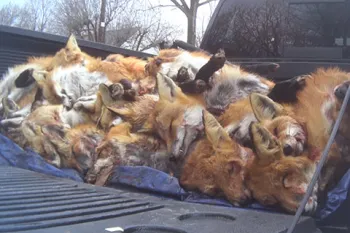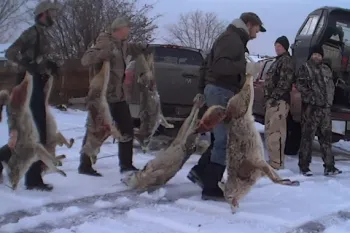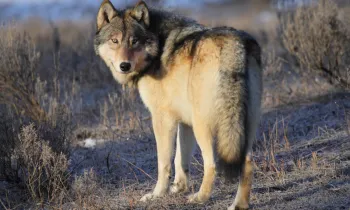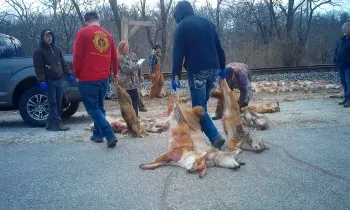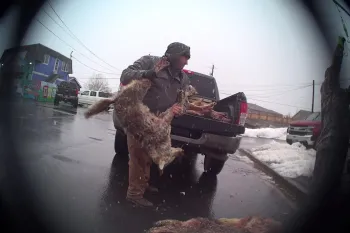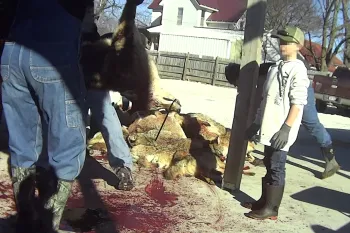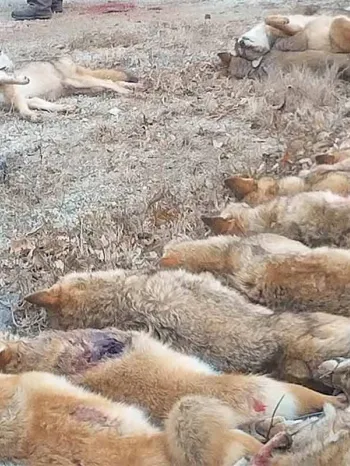
The HSUS
Wildlife killing contests
These senseless competitions promote the mass killing of animals for prizes and bragging rights.
Did you know?
Wildlife killing contests ignore the basic principles of hunting ethics. Many of these brutal events allow participants to use electronic calling devices that mimic sounds of the target animal’s prey or even young in distress. The animal rushes toward what they think is a cry for help—only to be gunned down.
“Wildlife killing contests have absolutely no place in the United States, including on our public lands. These animals should be respected for their intrinsic value and their key role in healthy ecosystems.”
—Katie Stennes, senior program manager for wildlife protection
Killed for cash or prizes
Wildlife killing contests are unsporting events where people attempt to kill large numbers of animals in a few short days. The contests often target native carnivores like foxes, bobcats, and coyotes, which play a critical role in healthy ecosystems. We must stop these inhumane contests. No animal should be killed for prizes or bragging rights.
Take Action
No animal should have to suffer cruel killing contests. Learn about some of our latest actions to put an end to this horrible practice to help protect all animals.
Frequently asked questions
Wildlife killing contests are a bloodsport like dogfighting or cockfighting. They are organized events during which participants compete to kill the most, the largest, or even the smallest wildlife species for cash and prizes. During the killing period, which typically lasts 24-48 hours, competitors lure animals in for an easy kill using electronic calling devices that mimic the sounds of dependent young or prey in distress. Competitors then shoot the animals with semi-automatic rifles, often fitted with night vision and thermal imaging scopes. Participants gather at a location to weigh and count the animals’ bodies to be judged for prize categories, take photos next to the bloody carcasses and receive their prizes. The animals are typically dumped like trash after the contest is over—they are not killed for their meat, and even their bullet-torn fur is often rendered useless for sale.
Across the U.S. every year, thousands of animals fall victim to these events. Bobcats, coyotes and foxes are the most common targets, but participants also slaughter badgers, crows, prairie dogs, rabbits, raccoons, squirrels, skunks, porcupines, woodchucks and even cougars and wolves in some states. These animals are frequently targeted in these events because there are almost no laws protecting them. They often can be killed in unlimited numbers, year-round and using almost any method. All wildlife species play integral roles in healthy ecosystems, and indiscriminately killing them harms our environment and our communities. Coyotes and foxes, for example, are filling the role of top carnivore in the American northeast, following the eradication of wolves and cougars. They provide a number of free, natural ecological services, and help to control disease transmission by keeping rodent populations in check, curtailing tick-borne diseases like Lyme.
These contests occur in nearly every U.S. state every year where they are still legal.
It varies by state, but generally a ban makes it unlawful for any person to organize, sponsor, promote, conduct or participate in an organized contest in which participants compete for cash or prizes for killing certain wildlife species. None of the state killing contest bans prohibit the otherwise lawful, regulated hunting of wildlife species, including the covered species, nor do they prohibit lawful, regulated fishing or fishing tournaments. They also do not prohibit big buck competitions (which are very different in nature from wildlife killing contests), nor do they prevent landowners, farmers or ranchers from using lethal control to protect livestock or property.
A 2022 poll by the respected firm remington research found that 80% of americans are opposed to wildlife killing contests. When it comes to wildlife, people—regardless of political beliefs—do not support practices that they view as pointless, unsporting, or wasteful. What’s more, hunters and wildlife agency professionals across the country have condemned killing contests as unethical and scientifically indefensible and have expressed fears that the events damage the reputation of hunters and even jeopardize the future of hunting itself. Only a miniscule percentage of people participate in these events, and they are pilfering the public’s wildlife for private gain.
No. The best available science shows that indiscriminately killing native carnivores is ineffective at controlling their numbers, preventing conflicts with livestock, or boosting populations of game species like deer or turkey for hunters. In fact, study after scientific study shows that indiscriminately killing coyotes (the most frequent victim of killing contests) can increase their populations and increase conflicts with livestock by disrupting the sensitive coyote pack structure that helps manage their numbers and behaviors.
Furthermore, common arguments regarding the impact of predator-livestock conflict are greatly exaggerated. According to U.S. Department of Agriculture (USDA) data, livestock losses to wild carnivores are minuscule. USDA data show that all carnivores combined are responsible for less than 0.5% of sheep and cattle losses.
Prevention—not lethal control—is the best method for minimizing conflicts with coyotes. Eliminating access to easy food sources, such as bird seed and garbage, supervising dogs while outside, and keeping cats indoors reduces conflicts with pets and humans. Practicing good animal husbandry and using strategic nonlethal predator control methods to protect livestock (such as electric fences, guard animals, and removing dead livestock) are more effective than lethal control in addressing coyote-human conflicts.
Yes. As of April 2025, 10 U.S. states have outlawed killing contests—California in 2014, Vermont in 2018, Massachusetts, New Mexico and Arizona in 2019, Colorado and Washington in 2020, Maryland in 2021, and Oregon and New York in 2023.
They need your help
Dogs rescued from a South Korean dog meat farm are awaiting transport to Canada. Donate to help get these dogs to safety and protect all animals from cruelty.
Jean Chung/For Humane World for Animals
